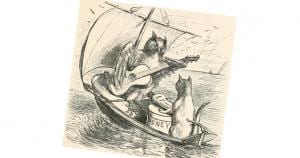 Sleep, hard to achieve the older I get, is a great blessing. When I cannot sleep, then Wordsworth comes to mind:
Sleep, hard to achieve the older I get, is a great blessing. When I cannot sleep, then Wordsworth comes to mind:
O gentle Sleep! do they belong to thee,
These twinklings of oblivion? Thou dost love
To sit in meekness, like the brooding Dove,
A Captive never wishing to be free.
This tiresome night, O Sleep! thou art to me
A Fly, that up and down himself doth shove
Upon a fretful rivulet, now above,
Now on the water vexed with mockery.
I have no pain that calls for patience, no;
Hence I am cross and peevish as a child:
And pleased by fits to have thee for my foe,
Yet ever willing to be reconciled:
O gentle Creature! do not use me so,
But once and deeply let me be beguiled!
A good night’s sleep rejuvenates and makes the mind sharp for the day ahead, yet sleep is not all comforters and fluffy pillows.
Sleep also is a vulnerable time. We cannot protect ourselves. Dante falls asleep in Purgatorio and has a dream, a fearful vision of an Eagle that comes to rend him from the Earth. Dante wakes up to discover he has been carried, but to a better place. There was no Eagle, Zeus in bird form, reenacting the horrible fate of Ganymede, but Saint Lucy who gently carried Dante forward on his quest. Like Dante, we can be acted on when asleep and so we pray for safety: gentle Saint Lucy not brutal Zeus.
Sleepers (often) have no memory of any experience: living without memory. Some spiritualists of the nineteenth century thought the soul escaped the body during sleep to look around metaphysical space. If so, a more thoughtful spiritualist might have asked, “What if the soul cannot return?”
Sleep has been compared to a little death. If death is like sleep, Hamlet worries “what dreams may come.” I have had one dream so often, for so long, that I wrote a novel to try to make the dream stop. CS Lewis understood that dreams as reality are a frightening possibility in Voyage of the Dawn Treader where foolish sailors rushed to a place where “dreams come true” only to find that the nightmares were the particular kind of dream that dominated there.
Reality (outside of dreams) is more predictable, law like, than dreams, but dreams come. I once read someone who said “death used to be more common” long ago . . .and thought, “Death was universal, outside of a miracle, long ago and just the same today.” What the writer meant, of course, was that death came much less predictably. We knew less and so a man on death’s door with a heart condition might drop to sleep and never wake up having not for one moment imagined that he was running out of sleeps until Paradise. We are better guessers now.
Since death is hidden from many of us, pushed off, sleep is sometimes a reminder. So many people die in their sleep, and most of us used to die at home . . .that we once prayed “and if I die before I wake, I pray thee Lord my soul to take.”
This was not quite right as it focused too much on dying, was too morbid. Death is a severe mercy, not the end of all things. Hamlet need not fear the undiscovered country, because a man has returned to tell us what is there and that it is good, just, and full of mercy. This is no myth (as Plato gave us in Republic X), but reality.
As usual, the ancient church has given us a better prayer that combines our need for sleep, our longing for rest, with our desire for protection, the knowledge that the long sleep is coming, and the hope that nightmares will give way to the Beatific Vision:
Under the protection of your wings I shall be covered and fall asleep, for in you only, Lord, does my hope lie. Into your hands, O Lord, I commend my soul and my body. Do bless me, do have mercy on me, and grant me eternal life. Amen.












